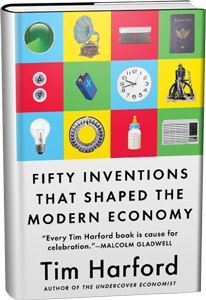The FM’s bookshelf: ‘Fifty Inventions That Shaped the Modern Economy’ by Tim Harford


The new book “Fifty Inventions that Shaped the Modern Economy,” by Tim Harford, examines the enormous impact that air condition has had on where cities were able to develop, where work could take place and how efficiently it could be done. (Spoiler alert: Studies suggest that 70 degrees is where workers peak at productivity so it’s had a HUGE impact.)
The Atlantic Monthly interviewed Harford in September. Here are a few excerpts:
“Tim Harford: It was really hard to cool things! Before the invention of air-conditioning, you had to take something that was very cold and move it to places that were hot. And there were fascinating problems. For example, when the bodies of water that supplied the ice, like lakes, started getting polluted, the pollutants would be trapped in the pieces of ice. When they melted at their destination, it filled the air with unpleasant smells.’
“Derek Thompson: Truly, thank God for Willis Carrier. The global effects of air-conditioning that you describe are mind-blowing. Air-conditioning transformed cities’ skylines, allowing for tall glassy skyscrapers that didn’t broil people in the top floors. It transformed demographics, allowing for migration in the U.S. to the Sun Belt, to Atlanta and Phoenix. By allowing politically conservative retirees to move south and west, you quote the author Steven Johnson saying that air-conditioning elected Ronald Reagan.’ ‘Harford: Yes, and it’s key to have a global perspective, too. This didn’t just reshape America. Air-conditioning reshaped the world. Places like Singapore and Shanghai are miserable when they’re hot and humid, but today they are global metropolises. There are studies saying that human productivity peaks around 70 degrees. That means that air-conditioning made us more productive, but also, by creating density in Singapore, it allows people to work longer and keep making the world a rich place. There is also the dark side of air-conditioning. You cool the temperature inside, but these units are energy-hungry, and they contribute to global warming.”
You can purchase the book here.
